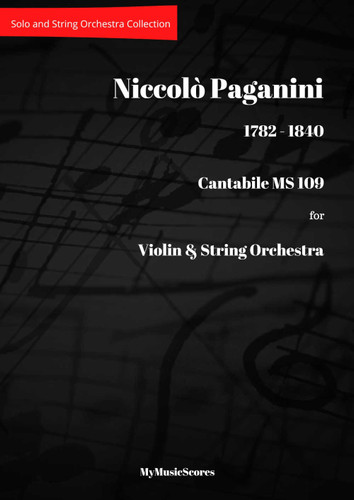-
 Paganini 3 Airs on the G string for Violin and Piano
Paganini 3 Airs on the G string for Violin and PianoStep into the virtuosic tradition of the 19th century with this captivating new edition of 3 Airs Va…
£0.00 -
 Paganini Mose Fantasy for Cello and String Orchestra
Paganini Mose Fantasy for Cello and String OrchestraPaganini: Mosè Fantasy for Cello and String Orchestra Experience the dazzling virtuosity and …
£22.99 -
 Paganini La Streghe Op. 8 for Violin String Orchestra
Paganini La Streghe Op. 8 for Violin String OrchestraPaganini: Le Streghe Op. 8 for Violin and String Orchestra Experience the dazzling pyrotechnics and …
£22.99 -
 Paganini Grand Sonata for Viola and String Orchestra
Paganini Grand Sonata for Viola and String OrchestraExperience the dazzling virtuosity and profound expressive power of Niccolò Paganini's remark…
£24.99 -
 Paganini Moto Perpetuo Op. 11 for Violin and String Orchestra
Paganini Moto Perpetuo Op. 11 for Violin and String OrchestraUnleash a whirlwind of dazzling energy with Niccolò Paganini's iconic Moto Perpetuo, Op. 11, …
£19.99 -
 Paganini Cantabile for Violin and String Orchestra
Paganini Cantabile for Violin and String OrchestraImmerse yourself in the profound beauty and lyrical charm of Niccolò Paganini's beloved Canta…
£22.99 -
 Paganini Moses Fantasy for Violin and String Orchestra
Paganini Moses Fantasy for Violin and String OrchestraPaganini: Mosè Fantasy for Violin and String Orchestra (Two Versions) Experience the dazzling…
£23.99

Paganini
Niccolò (or Nicolò) Paganini 27 October 1782 – 27 May 1840)
Niccolò Paganini was a renowned composer and violinist who was born in Genoa, Italy in 1782. He is considered one of the greatest violinists of all time, known for his technical virtuosity and expressive playing style. Paganini was a child prodigy, taking up the violin at the age of five and quickly becoming a skilled performer. He made his professional debut at the age of 12, and by the time he was in his 20s he had already established himself as a leading virtuoso.
Paganini’s music was groundbreaking, as he pushed the boundaries of what was thought to be possible on the violin. His compositions, which included 24 Caprices and the Concerto No. 1 in D Major, are still considered some of the most challenging works for violinists to this day. In addition to his compositions, Paganini was also known for his unique and innovative performance style, which included using the entire range of the violin and incorporating the use of harmonics and vibrato.
Despite his success, Paganini was plagued by poor health throughout his life and died in 1840 at the age of 57. However, his legacy as a composer and violinist lives on, as his music continues to be performed and admired by classical music enthusiasts around the world. In fact, many consider Paganini to be the father of modern violin technique, paving the way for future generations of virtuosos.